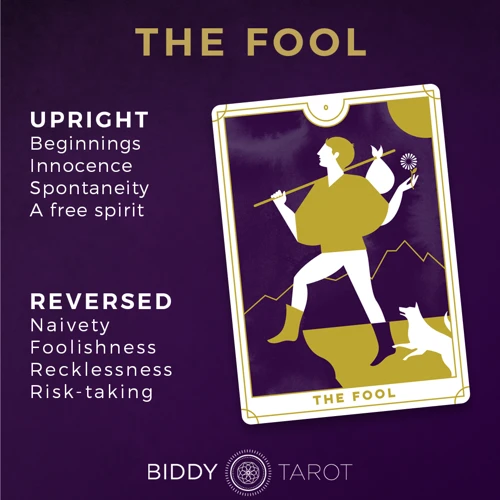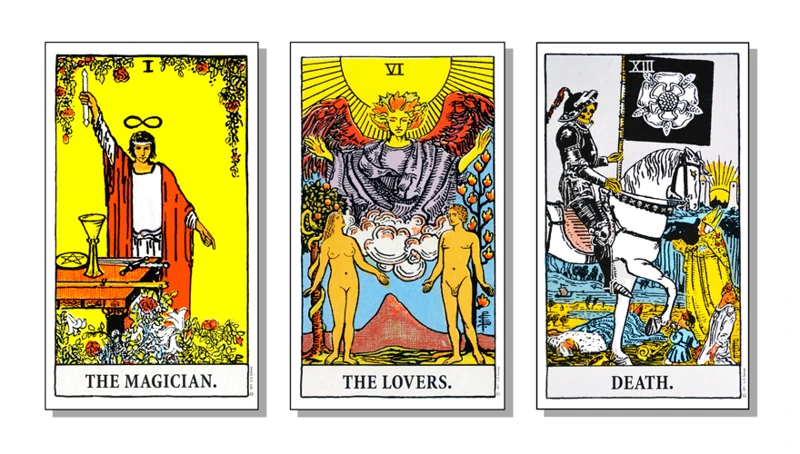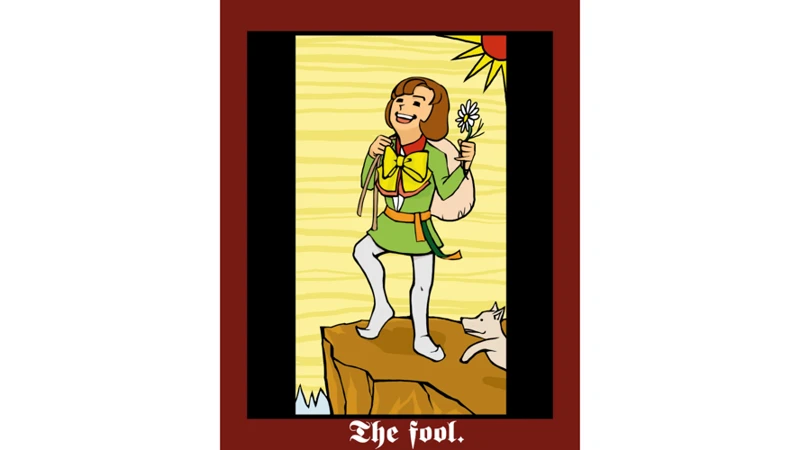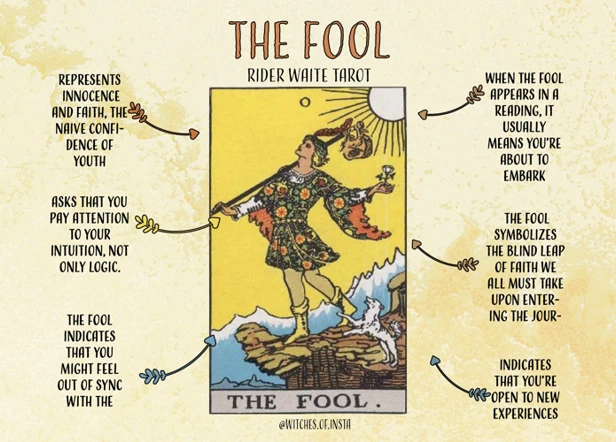Are you tired of being stuck in the same old routine? Do you yearn for adventure and new experiences? If so, the Fool Card may hold the key to unlocking a world of possibilities. In this guide, we will delve into the meaning of the Fool Card and explore how it can be applied in decision making. We will discuss the importance of taking risks and the benefits and growth opportunities that come with it. Get ready to step out of your comfort zone and embrace the unknown, as we unravel the mysteries of the Fool Card and discover how it can lead to a more fulfilled and exciting life.
Contents
- Meaning of the Fool Card
- Importance of Risk-Taking
- Applying the Fool Card in Decision Making
- Examples of Decision Making with the Fool Card
- Conclusion
-
Frequently Asked Questions
- 1. What does the Fool Card represent in Tarot readings?
- 2. How can the Fool Card be applied in decision making?
- 3. What are the benefits of taking risks in decision making?
- 4. How can the Fool Card help overcome fear and resistance?
- 5. How can someone trust their intuition when making decisions?
- 6. Why is embracing uncertainty important in decision making?
- 7. How can someone calculate risks effectively?
- 8. Can the Fool Card be applied to personal relationships?
- 9. How can the Fool Card be helpful in career transitions?
- 10. Is the Fool Card relevant to financial ventures?
- References
Meaning of the Fool Card

The Fool Card is a powerful and dynamic symbol in the Tarot deck, representing both risk and opportunity. It is often depicted as a young person standing at the edge of a cliff, ready to take a leap into the unknown. The Fool signifies a new beginning, a fresh start, and a sense of childlike wonder. This card is associated with spontaneity, adventure, and a willingness to embrace the unexpected. It encourages us to let go of our fears and limitations and to trust in the journey ahead. The Fool Card is a reminder that sometimes in order to grow and evolve, we must be willing to take a leap of faith, even if the outcome is uncertain. It serves as a reminder that life is a grand adventure, full of twists and turns, and that taking risks can lead to amazing discoveries and opportunities for personal growth. If you’d like to learn more about the Tarot and its symbolism, consider exploring our guide on the Hanged Man Card or the Tower Card.
Symbolism and Interpretations
The symbolism of the Fool Card is rich and layered, offering various interpretations and insights into its meaning. Here are some key aspects to consider:
- The Cliff: The Fool is often depicted standing at the edge of a cliff, representing the threshold between the familiar and the unknown. It symbolizes the moment of decision, the leap of faith, and the courage to step into uncharted territory.
- The Bag: The Fool carries a small bag or satchel, symbolizing the potential and untapped resources that they carry with them on their journey. It represents the tools, knowledge, and skills we possess that can help us navigate through the challenges ahead.
- The White Rose: The presence of a white rose in the Fool’s hand signifies purity, innocence, and a sense of grace. It reminds us to approach new experiences and challenges with an open heart and a sense of wonder, free from preconceived notions or judgments.
- The Dog: Often depicted at the Fool’s feet, the loyal companion represents loyalty and protection. It serves as a reminder that we are not alone in our journey and that we can rely on the support and guidance of trusted friends and allies.
- Reversal: In some interpretations of the Fool Card, it is depicted upside down or in reverse. This may signify a warning to exercise caution and consider the potential consequences of our actions before taking a leap of faith. It reminds us to strike a balance between risk-taking and practicality.
The symbolism of the Fool Card is subjective and can vary depending on the individual’s interpretation and intuition. Its imagery offers a powerful invitation to embrace the unknown, take risks, and trust in the journey ahead. If you’re interested in exploring more Tarot symbolism, you may find our guide on the Star Card insightful.
Importance of Risk-Taking

Risk-taking is an essential aspect of personal and professional growth. While it may seem daunting, stepping outside of our comfort zones and embracing uncertainty can lead to numerous benefits and opportunities for development. When we take risks, we open ourselves up to new experiences and possibilities that we may have otherwise missed. It allows us to break free from the monotony of everyday life and provides us with a sense of excitement and fulfillment. By taking risks, we build resilience and become more adaptable to change, which is crucial in today’s fast-paced world. Risk-taking helps us overcome fear and resistance, as it forces us to confront our limiting beliefs and expand our boundaries. Whether it’s starting a new business, pursuing a passion, or entering into a new relationship, the willingness to take risks propels us forward on our journey of self-discovery and personal growth.
Benefits and Growth Opportunities
- Self-Discovery: Taking risks allows us to step out of our comfort zones and explore new possibilities. It opens doors to self-discovery and helps us uncover hidden strengths, talents, and passions that we may not have otherwise realized. By embracing the unknown and challenging ourselves, we have the opportunity to grow and evolve on a personal level.
- Learning and Adaptability: When we take risks, we expose ourselves to new experiences and unfamiliar situations. This promotes a mindset of constant learning and adaptability. We become better equipped to handle unexpected challenges and navigate through changes with resilience and creativity. By continuously pushing our boundaries, we expand our knowledge and gain valuable life skills.
- Opportunity for Success: Taking calculated risks can lead to great opportunities and potential success. It allows us to seize the moment and make bold moves that can propel us forward in our careers, relationships, and personal lives. By embracing risk, we open ourselves up to achieving our goals and reaching new heights we may not have otherwise reached.
- Increased Confidence: Stepping outside our comfort zones and facing risks head-on builds confidence and self-belief. Each risk we take, regardless of the outcome, contributes to our personal growth and strengthens our belief in our abilities. With every successful risk, we become more confident in our decision-making abilities, which positively impacts all areas of our lives.
Overcoming Fear and Resistance
Fear and resistance are natural reactions when it comes to taking risks and making decisions outside of our comfort zone. However, overcoming these obstacles is crucial for personal growth and development. Here are some strategies to help overcome fear and resistance:
| 1. Identify the fears: | Start by identifying the specific fears that are holding you back. Are you afraid of failure? Rejection? Uncertainty? Understanding your fears can help you confront and address them. |
| 2. Challenge your beliefs: | Examine the beliefs and assumptions that underlie your fears. Are they based on reality or are they rooted in self-doubt or limiting beliefs? Challenge these beliefs and replace them with more empowering ones. |
| 3. Take small steps: | Instead of diving headfirst into a major risk, start by taking small steps outside of your comfort zone. Gradually increase the level of challenge as you build confidence and experience success. |
| 4. Seek support: | Reach out to friends, mentors, or support groups who can provide encouragement and guidance. Surrounding yourself with positive influences can help alleviate fear and resistance. |
| 5. Visualize success: | Use visualization techniques to imagine yourself successfully navigating through the risks and challenges. Visualizing positive outcomes can help reduce fear and increase confidence. |
| 6. Learn from failure: | Embrace failure as an opportunity for growth and learning. Instead of seeing failure as a setback, view it as a stepping stone towards success. Reflect on the lessons learned and apply them to future decisions. |
By implementing these strategies, you can gradually overcome fear and resistance, making it easier to embrace the risks and uncertainties that come with decision making. Remember, the Fool Card teaches us that taking risks is an essential part of the journey towards self-discovery and personal fulfillment.
Applying the Fool Card in Decision Making

When it comes to decision making, applying the energy of the Fool Card can be incredibly valuable. The Fool encourages us to trust our intuition and take risks, even when faced with uncertainty. To apply the Fool Card in decision making, start by tuning into your inner voice and trusting your gut instincts. This means embracing your intuition and allowing it to guide you towards the right path. Alongside intuition, the Fool also reminds us to embrace uncertainty and let go of the need for complete control. It encourages us to step outside of our comfort zones and embrace the unknown, knowing that it is often in the realm of the unknown that the greatest opportunities lie. Finally, the Fool Card urges us to calculate risks and consider the potential outcomes of our decisions. While being open to taking risks, it is also important to weigh the pros and cons and make informed choices. By applying these principles, you can harness the energy of the Fool Card and make bold, courageous decisions that lead to personal growth and fulfillment.
Trusting Your Intuition
When it comes to decision-making, trusting your intuition can be a powerful tool. Intuition is that inner voice or gut feeling that guides us towards what feels right. It is a subconscious understanding that goes beyond logic and reasoning. When we trust our intuition, we tap into a deeper level of wisdom and insight that can lead us in the right direction.
Trusting your intuition means learning to listen to your inner voice and honoring the messages it sends. It requires letting go of doubt and overthinking, and instead embracing a sense of inner knowing. This doesn’t mean making decisions impulsively or without consideration. Rather, it means being open to the whispers of your intuition and allowing them to inform your decision-making process.
One way to develop trust in your intuition is to practice mindfulness and self-awareness. Take time to quiet the noise around you and tune in to your inner self. Pay attention to any bodily sensations, emotions, or subtle cues that may arise when considering a decision. Trust that your intuition is trying to communicate with you.
Another way to cultivate trust in your intuition is to reflect on past experiences where you followed your intuition and it proved to be accurate. Recall moments when you felt that nudge in a certain direction and it led to positive outcomes. These instances serve as reminders that your intuition is a reliable guide.
It’s important to note that trusting your intuition doesn’t mean you have to ignore reason and evidence. It’s about finding a balance between rational thinking and intuitive guidance. Consider gathering information and weighing the pros and cons, but also pay attention to how you feel about the decision. Does it align with your core values and goals? Does it resonate with your authentic self?
Trusting your intuition can help you make decisions that are in alignment with your true desires and highest good. It allows you to tap into your inner wisdom and make choices that feel right for you, even if they may seem unconventional or risky. So, the next time you’re faced with a decision, take a moment to pause, listen to your intuition, and trust in the guidance it provides.
Embracing Uncertainty
Embracing Uncertainty
- Letting go of control: When faced with uncertainty, it can be tempting to cling to a sense of control. However, embracing uncertainty means letting go of the need for certainty and surrendering to the flow of life. It involves acknowledging that not everything can be predicted or controlled, and being open to the possibilities that arise.
- Adapting to change: Uncertainty often brings about change, and embracing it requires a willingness to adapt. This means being flexible in our plans and expectations, and being open to new ideas and perspectives. By embracing uncertainty and being adaptable, we can navigate through life’s challenges with greater ease and resilience.
- Cultivating a growth mindset: Embracing uncertainty also involves cultivating a growth mindset. Instead of viewing uncertainty as a threat, we can see it as an opportunity for growth and learning. By reframing our mindset, we can approach uncertain situations with curiosity, optimism, and a willingness to explore new possibilities.
- Practicing mindfulness: Mindfulness can be a powerful tool for embracing uncertainty. By staying present and grounded in the present moment, we can reduce anxiety and fear about the unknown. Mindfulness allows us to observe our thoughts and emotions without judgment, enabling us to respond to uncertainty with clarity and resilience.
Embracing uncertainty can be challenging, but it can also lead to personal growth and expanded horizons. It allows us to step outside of our comfort zones and discover new paths that we may have never considered before. By embracing uncertainty, we can cultivate a sense of adventure and openness, and experience life in a more vibrant and fulfilling way.
Calculating Risks
- Evaluating potential outcomes: When calculating risks, it’s important to carefully evaluate the potential outcomes of a decision. Consider the best-case scenario, the worst-case scenario, and any intermediate possibilities. This helps in determining whether the potential benefits outweigh the potential drawbacks.
- Analyzing probabilities: Quantifying the likelihood of different outcomes is crucial in risk assessment. Assess the probability of each outcome occurring based on available information and analytical tools. This analysis helps in making more informed decisions.
- Considering the consequences: Calculating risks involves considering both the short-term and long-term consequences of a decision. Think about the impact it may have on various aspects of your life, such as finances, relationships, and personal well-being. Understanding the potential consequences allows for better risk management.
- Seeking expert advice: In situations where the risks are particularly high or complex, it can be beneficial to consult with experts or professionals. Their insights and expertise can provide valuable perspectives and help in making more accurate risk assessments.
Remember, risk-taking does not mean making reckless decisions without any consideration. It involves carefully assessing the potential risks and rewards, evaluating probabilities, and taking calculated steps towards achieving your goals.
Examples of Decision Making with the Fool Card
The Fool Card can be applied in various aspects of life, aiding in decision making and encouraging us to take risks. In personal relationships, the Fool Card prompts us to let go of past traumas and fears, and instead, approach new connections with an open mind and heart. It encourages us to embrace vulnerability and trust in the potential for love and meaningful connections. When it comes to career transitions, the Fool Card reminds us that sometimes we need to take bold leaps to pursue our passions and embark on new professional paths. It encourages us to have faith in our abilities and to not be limited by societal expectations or fear of failure. In financial ventures, the Fool Card can inspire us to invest in new opportunities and take calculated risks that can lead to financial growth and abundance. It teaches us to trust our instincts and to weigh the potential rewards against the potential risks. The examples provided demonstrate how the Fool Card can guide us in decision making, urging us to embrace the unknown and seize opportunities for personal and professional growth.
Personal Relationships
When it comes to personal relationships, the Fool Card can be a valuable guide in decision-making. In matters of the heart, taking risks can lead to profound connections and transformative experiences. The Fool encourages you to embrace the unknown and approach relationships with an open mind and heart. It urges you to let go of past hurts or preconceived notions and allow yourself to be vulnerable. Whether you’re starting a new relationship or considering taking it to the next level, the Fool Card reminds you to trust your intuition and take a leap of faith. It encourages you to be bold in expressing your feelings and desires, knowing that by taking a risk, you may discover a deep and fulfilling connection. However, it is important to strike a balance and also consider the potential risks involved. The Fool Card reminds you to approach relationships with a sense of adventure, but also with caution and awareness. By combining trust in your instincts with a calculated assessment of the situation, you can navigate the realm of personal relationships with confidence and authenticity.
Career Transitions
When it comes to career transitions, the Fool Card can be a guiding light in making bold decisions. Often, we find ourselves stuck in jobs that no longer fulfill us or align with our passions. The Fool urges us to take a leap of faith and pursue a new path that resonates with our true ambitions. By embracing the energy of the Fool, we can overcome the fear of uncertainty and embark on a journey of self-discovery and professional growth.
Transitioning careers can be daunting, but the Fool Card encourages us to trust our instincts and follow our intuition. It reminds us that taking risks can lead to unexpected opportunities and fulfillment. The Fool symbolizes the freedom to explore new possibilities, just as one might venture into a new career. It prompts us to take a leap of faith, embracing the unknown and turning it into an exciting adventure.
Calculating the risks involved in a career transition is important, and the Fool Card encourages us to do so while also being open to potential rewards. It reminds us that sometimes the greatest rewards come from stepping outside of our comfort zones and pursuing our passions. This card encourages us to look beyond practicality and societal expectations, and to instead pursue what truly makes us happy and fulfilled.
In the realm of career transitions, the Fool Card can provide the confidence and courage needed to make significant changes. It serves as a reminder that it’s never too late to pursue a new path, follow our dreams, and find fulfillment in our professional lives. By embracing the energy of the Fool, we can approach career transitions with optimism, curiosity, and a willingness to take calculated risks.
Financial Ventures
- Investments: The Fool Card encourages individuals to consider taking risks when it comes to their financial ventures. This could mean venturing into new investment opportunities or diversifying one’s portfolio by exploring different asset classes. Embracing the uncertainty and being open to unexpected outcomes can lead to potentially lucrative returns.
- Starting a business: For aspiring entrepreneurs, the Fool Card signifies the courage to take the leap and start their own business. It encourages individuals to trust their instincts and embrace the unknown, even if it means stepping outside of their comfort zone. Starting a business involves financial risks, but it can also bring great rewards and personal fulfillment.
- Exploring new financial strategies: The Fool Card urges individuals to think outside the box when it comes to their financial strategies. It encourages them to explore unconventional investment opportunities or explore innovative approaches to managing their finances. By embracing a creative and open-minded mindset, individuals can potentially discover new avenues for financial growth.
- Taking calculated risks: While the Fool Card emphasizes the importance of taking risks, it also advises individuals to approach financial ventures with a certain level of caution. It encourages individuals to assess and calculate the risks involved, to conduct thorough research, and to make informed decisions. By balancing risk and prudence, individuals can navigate the world of financial ventures with more confidence.
Conclusion
In conclusion, the Fool Card serves as a powerful reminder of the importance of taking risks in decision making. By embracing the energy and symbolism of the Fool, we open ourselves up to new opportunities and growth. The Fool encourages us to trust our intuition, let go of fear, and embrace uncertainty. It reminds us that sometimes the greatest rewards come from stepping out of our comfort zones and venturing into the unknown. Whether it’s in personal relationships, career transitions, or financial ventures, the Fool Card reminds us that calculated risks can lead to remarkable outcomes. So, the next time you find yourself faced with a decision, consider the wisdom of the Fool Card and dare to take that leap of faith. Who knows what incredible adventures await on the other side? Remember, life is meant to be lived to the fullest, and sometimes that means taking a chance and embracing the Fool within.+
Frequently Asked Questions
1. What does the Fool Card represent in Tarot readings?
The Fool Card represents new beginnings, spontaneity, and a sense of adventure. It symbolizes taking risks and embracing uncertainty in order to grow and evolve.
2. How can the Fool Card be applied in decision making?
The Fool Card can be applied in decision making by encouraging individuals to trust their intuition, embrace uncertainty, and calculate risks before making a choice.
3. What are the benefits of taking risks in decision making?
Taking risks in decision making allows individuals to experience personal growth, discover new opportunities, and break free from limitations and routines.
4. How can the Fool Card help overcome fear and resistance?
The Fool Card reminds individuals that fear and resistance are normal but should not hold them back from taking chances and pursuing their desires.
5. How can someone trust their intuition when making decisions?
Trusting your intuition involves paying attention to your gut feelings, inner wisdom, and subtle cues from your subconscious mind. It requires self-awareness and practice.
6. Why is embracing uncertainty important in decision making?
Embracing uncertainty allows individuals to open themselves up to new possibilities, ideas, and experiences, fostering personal growth and resilience.
7. How can someone calculate risks effectively?
Calculating risks involves evaluating the potential outcomes, considering the probability of success or failure, and assessing the potential impact on one’s life or goals.
8. Can the Fool Card be applied to personal relationships?
Yes, the Fool Card can be applied to personal relationships by encouraging individuals to take risks in expressing their feelings, embracing vulnerability, and trying new relationship dynamics.
9. How can the Fool Card be helpful in career transitions?
The Fool Card can provide the motivation and courage to pursue new career paths, navigate uncertainties, and embrace opportunities for growth and fulfillment.
10. Is the Fool Card relevant to financial ventures?
Yes, the Fool Card is relevant to financial ventures as it encourages individuals to take calculated risks, explore new investments, and have faith in their abilities to create prosperity.






